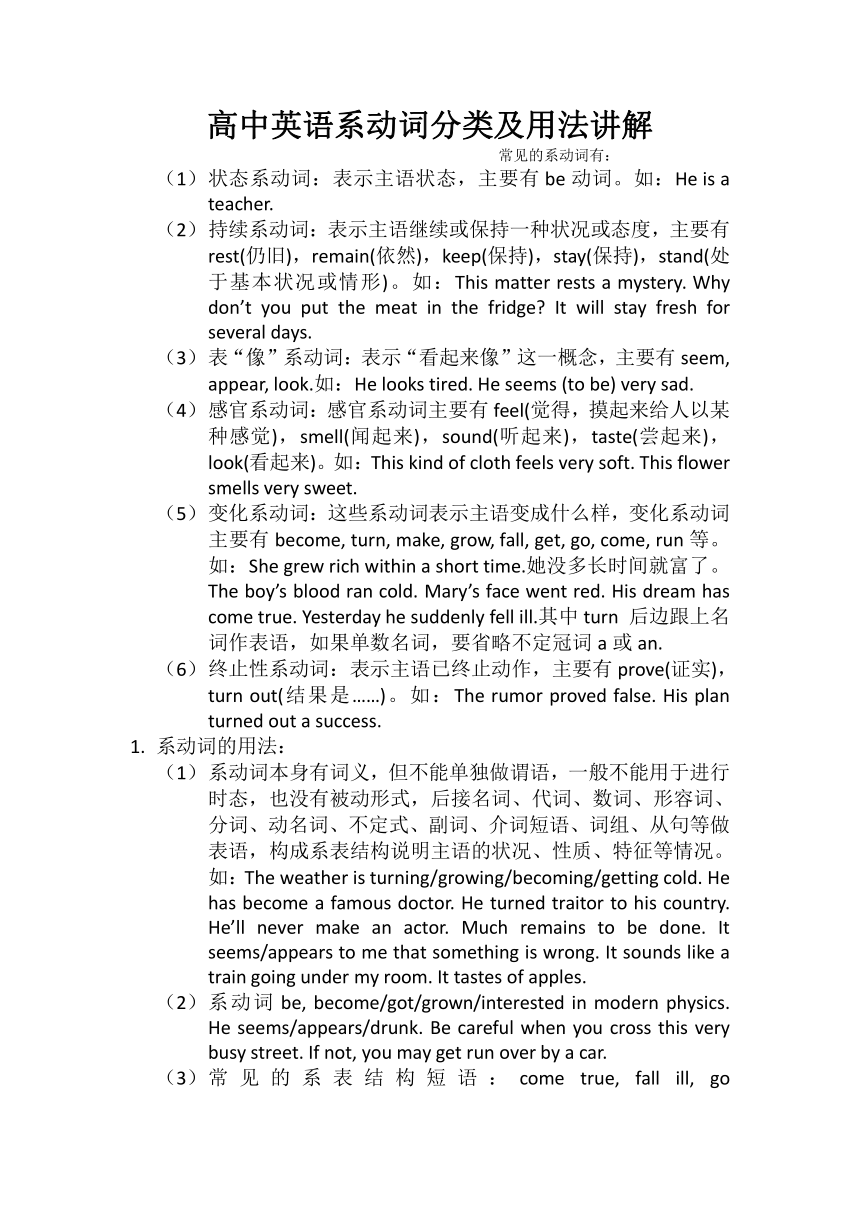2022届高三英语二轮复习:英语系动词分类及用法讲解学案
文档属性
| 名称 | 2022届高三英语二轮复习:英语系动词分类及用法讲解学案 |  | |
| 格式 | doc | ||
| 文件大小 | 27.5KB | ||
| 资源类型 | 教案 | ||
| 版本资源 | 通用版 | ||
| 科目 | 英语 | ||
| 更新时间 | 2021-12-03 07:29:52 | ||
图片预览

文档简介
高中英语系动词分类及用法讲解
常见的系动词有:
(1) 状态系动词:表示主语状态,主要有be动词。如:He is a teacher.
(2) 持续系动词:表示主语继续或保持一种状况或态度,主要有rest(仍旧),remain(依然),keep(保持),stay(保持),stand(处于基本状况或情形)。如:This matter rests a mystery. Why don’t you put the meat in the fridge It will stay fresh for several days.
(3) 表“像”系动词:表示“看起来像”这一概念,主要有seem, appear, look.如:He looks tired. He seems (to be) very sad.
(4) 感官系动词:感官系动词主要有feel(觉得,摸起来给人以某种感觉),smell(闻起来),sound(听起来),taste(尝起来),look(看起来)。如:This kind of cloth feels very soft. This flower smells very sweet.
(5) 变化系动词:这些系动词表示主语变成什么样,变化系动词主要有become, turn, make, grow, fall, get, go, come, run等。如:She grew rich within a short time.她没多长时间就富了。The boy’s blood ran cold. Mary’s face went red. His dream has come true. Yesterday he suddenly fell ill.其中turn 后边跟上名词作表语,如果单数名词,要省略不定冠词a或an.
(6) 终止性系动词:表示主语已终止动作,主要有prove(证实), turn out(结果是……)。如:The rumor proved false. His plan turned out a success.
1. 系动词的用法:
(1) 系动词本身有词义,但不能单独做谓语,一般不能用于进行时态,也没有被动形式,后接名词、代词、数词、形容词、分词、动名词、不定式、副词、介词短语、词组、从句等做表语,构成系表结构说明主语的状况、性质、特征等情况。如:The weather is turning/growing/becoming/getting cold. He has become a famous doctor. He turned traitor to his country. He’ll never make an actor. Much remains to be done. It seems/appears to me that something is wrong. It sounds like a train going under my room. It tastes of apples.
(2) 系动词be, become/got/grown/interested in modern physics. He seems/appears/drunk. Be careful when you cross this very busy street. If not, you may get run over by a car.
(3) 常见的系表结构短语:come true, fall ill, go bad/blind/deaf/blind, keep fit, run cold, go hungry等。
(4) 【典例1】The traffic lights ______ green and I pulled away.
A. came B. grew C. got D. went
[答案与解析]D. 本题考查四个表示“变得,成为”之意的系动词的区别。Grow 表示一种渐变的过程,而且动作不可逆;come 和 get 也是不可逆的动作,一般不和表示颜色的词连用。 go 相当于 turn, 动作既可逆也可不逆。句意为:“绿灯一亮我就开车走了。”
【典例2】Emergency line operators must always _______ calm and make sure that they get all the information they need to send help.
A. grow B. appear C. become D. stay
[答案与解析]D。供选项四个词均为连系动词:A 项意为“变得”;B项意为“好像、似乎”;C项意为“成为,变得”;D项意为“保持某状态”。句意为:“紧急事务接线员必须随时保持沉着,确保能够收到所有的求助信息。”由句意判断选D项。
常见的系动词有:
(1) 状态系动词:表示主语状态,主要有be动词。如:He is a teacher.
(2) 持续系动词:表示主语继续或保持一种状况或态度,主要有rest(仍旧),remain(依然),keep(保持),stay(保持),stand(处于基本状况或情形)。如:This matter rests a mystery. Why don’t you put the meat in the fridge It will stay fresh for several days.
(3) 表“像”系动词:表示“看起来像”这一概念,主要有seem, appear, look.如:He looks tired. He seems (to be) very sad.
(4) 感官系动词:感官系动词主要有feel(觉得,摸起来给人以某种感觉),smell(闻起来),sound(听起来),taste(尝起来),look(看起来)。如:This kind of cloth feels very soft. This flower smells very sweet.
(5) 变化系动词:这些系动词表示主语变成什么样,变化系动词主要有become, turn, make, grow, fall, get, go, come, run等。如:She grew rich within a short time.她没多长时间就富了。The boy’s blood ran cold. Mary’s face went red. His dream has come true. Yesterday he suddenly fell ill.其中turn 后边跟上名词作表语,如果单数名词,要省略不定冠词a或an.
(6) 终止性系动词:表示主语已终止动作,主要有prove(证实), turn out(结果是……)。如:The rumor proved false. His plan turned out a success.
1. 系动词的用法:
(1) 系动词本身有词义,但不能单独做谓语,一般不能用于进行时态,也没有被动形式,后接名词、代词、数词、形容词、分词、动名词、不定式、副词、介词短语、词组、从句等做表语,构成系表结构说明主语的状况、性质、特征等情况。如:The weather is turning/growing/becoming/getting cold. He has become a famous doctor. He turned traitor to his country. He’ll never make an actor. Much remains to be done. It seems/appears to me that something is wrong. It sounds like a train going under my room. It tastes of apples.
(2) 系动词be, become/got/grown/interested in modern physics. He seems/appears/drunk. Be careful when you cross this very busy street. If not, you may get run over by a car.
(3) 常见的系表结构短语:come true, fall ill, go bad/blind/deaf/blind, keep fit, run cold, go hungry等。
(4) 【典例1】The traffic lights ______ green and I pulled away.
A. came B. grew C. got D. went
[答案与解析]D. 本题考查四个表示“变得,成为”之意的系动词的区别。Grow 表示一种渐变的过程,而且动作不可逆;come 和 get 也是不可逆的动作,一般不和表示颜色的词连用。 go 相当于 turn, 动作既可逆也可不逆。句意为:“绿灯一亮我就开车走了。”
【典例2】Emergency line operators must always _______ calm and make sure that they get all the information they need to send help.
A. grow B. appear C. become D. stay
[答案与解析]D。供选项四个词均为连系动词:A 项意为“变得”;B项意为“好像、似乎”;C项意为“成为,变得”;D项意为“保持某状态”。句意为:“紧急事务接线员必须随时保持沉着,确保能够收到所有的求助信息。”由句意判断选D项。
